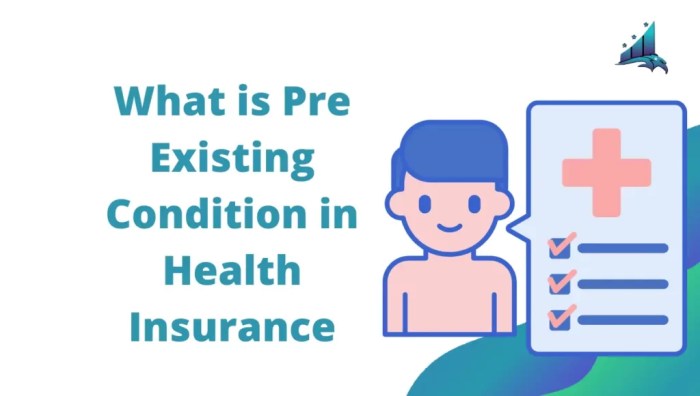What is the best insurance for people with pre-existing conditions? This question is a common concern for many individuals who face health challenges. Navigating the insurance landscape can be overwhelming, especially when dealing with pre-existing conditions that may impact coverage and costs.
Understanding your options and finding the right plan can make a significant difference in your financial well-being and access to essential healthcare.
Pre-existing conditions are health issues you had before starting a new insurance plan. They can include anything from diabetes and heart disease to mental health conditions and allergies. Insurance companies often consider these conditions when determining eligibility and coverage, sometimes leading to higher premiums or limited benefits.
However, navigating these challenges is possible with the right information and guidance.
Understanding Pre-Existing Conditions
Pre-existing conditions refer to any health issues, illnesses, or injuries you have before applying for health insurance. These conditions can affect your eligibility for coverage, the cost of your premiums, and even the specific benefits you receive. It’s crucial to understand how pre-existing conditions are handled in the insurance world to make informed decisions about your health coverage.
Common Examples of Pre-Existing Conditions
Pre-existing conditions can range from common ailments to more serious health issues. Here are some examples:
- Chronic diseases:Diabetes, asthma, heart disease, high blood pressure, arthritis, and cancer are common examples of chronic conditions that can be considered pre-existing.
- Mental health conditions:Depression, anxiety, and bipolar disorder are mental health conditions that can impact insurance eligibility.
- Past injuries:Injuries that require ongoing treatment or have long-term effects, such as a back injury or a broken bone, can be considered pre-existing.
- Previous surgeries:If you’ve had surgery in the past, especially for a significant health issue, it could be considered a pre-existing condition.
- Medications:Taking regular medication for a health condition can also be considered a pre-existing condition.
The Legal Landscape of Pre-Existing Conditions
The legal landscape surrounding pre-existing conditions has undergone significant changes in recent years. The Affordable Care Act (ACA) has made it illegal for insurance companies to deny coverage or charge higher premiums based solely on pre-existing conditions. This means that individuals with pre-existing conditions have the same access to health insurance as those without them.
“The Affordable Care Act prohibits health insurance companies from denying coverage or charging higher premiums based on a person’s health status, including pre-existing conditions.”The U.S. Department of Health and Human Services
However, it’s important to note that some limitations may still apply. For example, some insurance plans may have waiting periods before coverage for pre-existing conditions becomes effective.
Types of Insurance for Pre-Existing Conditions

It can be tough to find the right insurance when you have a pre-existing condition. But, there are several types of insurance you can consider to help protect yourself financially. Here’s a breakdown of the most relevant types and what they cover.
Health Insurance, What is the best insurance for people with pre-existing conditions?
Health insurance is the most important type of insurance for people with pre-existing conditions. It covers the costs of medical care, including doctor’s visits, hospital stays, prescription drugs, and more.
- Individual Health Insurance:This type of insurance is purchased by individuals directly from an insurance company. It’s a good option for people who are self-employed or don’t have access to employer-sponsored health insurance.
- Employer-Sponsored Health Insurance:Many employers offer health insurance plans to their employees. These plans can be a good option for people with pre-existing conditions, as they often offer comprehensive coverage.
- Medicare:Medicare is a federal health insurance program for people over age 65, people with certain disabilities, and people with end-stage renal disease. Medicare offers various plans, some of which can be more beneficial to individuals with pre-existing conditions.
- Medicaid:Medicaid is a state-run health insurance program for low-income individuals and families. Medicaid can provide comprehensive health coverage, including for pre-existing conditions.
Disability Insurance
Disability insurance can help protect you financially if you become unable to work due to a disability. It pays you a monthly benefit, which can help cover your living expenses while you’re out of work.
- Individual Disability Insurance:This type of insurance is purchased by individuals directly from an insurance company. It’s a good option for people who want more control over their coverage.
- Employer-Sponsored Disability Insurance:Many employers offer disability insurance plans to their employees. These plans can be a good option for people who want the convenience of having their coverage through their employer.
Life Insurance
Life insurance can help protect your loved ones financially if you die. It pays a death benefit to your beneficiaries, which can help cover expenses such as funeral costs, mortgage payments, and other debts.
- Term Life Insurance:This type of insurance provides coverage for a specific period, such as 10, 20, or 30 years. It’s a good option for people who need coverage for a limited time, such as while they have young children or a mortgage.
- Permanent Life Insurance:This type of insurance provides coverage for your entire life. It’s a good option for people who want to ensure their loved ones are financially protected for the long term.
Factors Influencing Insurance Costs

Getting insurance for pre-existing conditions can feel like a maze, especially when you’re trying to understand how much it’ll cost. But don’t worry, we’re here to break it down. Your insurance premium, the monthly amount you pay, is influenced by several factors, and your pre-existing condition is a major player.
Let’s explore the key factors that shape your insurance costs.
Age
Your age is a significant factor in determining your insurance premium. As you get older, your risk of developing health problems increases, leading to higher costs. Insurance companies use actuarial tables to estimate the likelihood of you needing healthcare services based on your age.
Younger individuals generally have lower premiums than older individuals.
Health Status
Your overall health status is another key factor influencing your insurance costs. If you have pre-existing conditions, you’re more likely to require healthcare services, making your insurance premium higher. For example, someone with diabetes might have higher premiums compared to someone with no pre-existing conditions.
Specific Pre-Existing Conditions
The specific pre-existing conditions you have also play a crucial role in determining your insurance premium. Some conditions, like heart disease or cancer, are more expensive to treat than others, leading to higher premiums. The severity and management of your condition also influence the cost.
Risk Assessment and Underwriting
Insurance companies use a process called risk assessment and underwriting to evaluate your health status and determine your insurance premium. They analyze your medical history, lifestyle, and other factors to assess your risk of needing healthcare services. If you have pre-existing conditions, the underwriting process might result in higher premiums to reflect the increased risk.
Finding the Right Insurance Plan

You’ve learned about the basics of pre-existing conditions and the different types of insurance available. Now, it’s time to dive into the exciting world of finding the perfect plan for your needs! This section will guide you through the process of choosing the right insurance plan, considering your unique situation and pre-existing conditions.
Factors to Consider When Evaluating Insurance Plans
Before you start comparing plans, it’s important to know what to look for. There are several key factors that will influence your decision.
- Coverage:Make sure the plan covers your specific pre-existing conditions. This includes understanding the extent of coverage, such as the maximum amount of coverage for treatments or medications related to your conditions.
- Premiums:Premiums are the monthly payments you make for your insurance. Consider your budget and choose a plan with premiums you can comfortably afford.
- Deductibles:The deductible is the amount you pay out-of-pocket before your insurance starts covering costs. A higher deductible usually means lower premiums, but you’ll need to pay more before your insurance kicks in.
- Co-pays:Co-pays are fixed amounts you pay for specific services, like doctor visits or prescriptions. Look for plans with reasonable co-pays that align with your budget.
- Network:The network is a list of doctors, hospitals, and other healthcare providers that your insurance plan covers. Ensure that your preferred doctors and facilities are within the plan’s network.
Resources and Tools for Comparing Insurance Plans
There are several resources available to help you compare and choose the right insurance plan.
- Health Insurance Marketplace:The Health Insurance Marketplace (healthcare.gov) is a great place to start. You can compare plans, see your eligibility for subsidies, and enroll in coverage.
- Insurance Brokers:Independent insurance brokers can help you navigate the insurance landscape and find plans that meet your specific needs. They often have access to a wider range of plans than you might find on your own.
- Consumer Reports:Consumer Reports offers unbiased reviews and ratings of health insurance plans. They can help you compare plans and make informed decisions.
- Your Doctor:Don’t hesitate to ask your doctor for recommendations on insurance plans. They may have insights into which plans offer the best coverage for your specific pre-existing conditions.
End of Discussion

Finding the right insurance for pre-existing conditions is a journey that requires research, planning, and a good understanding of your needs. By carefully considering factors like coverage, costs, and potential limitations, you can make informed decisions that ensure access to the healthcare you deserve.
Remember, seeking advice from insurance professionals and exploring resources dedicated to pre-existing conditions can provide valuable insights and support throughout the process.
Clarifying Questions: What Is The Best Insurance For People With Pre-existing Conditions?
What are some common examples of pre-existing conditions?
Common examples include diabetes, heart disease, asthma, cancer, arthritis, mental health conditions, and autoimmune disorders.
How do pre-existing conditions affect my insurance premiums?
Insurance companies may charge higher premiums for individuals with pre-existing conditions due to the potential for higher healthcare costs. The specific impact depends on the condition and the insurance plan.
Are there any resources available to help me find insurance with pre-existing conditions?
Yes, several resources can help. You can consult with insurance brokers, use online comparison tools, and reach out to consumer advocacy groups specializing in health insurance.
Can I be denied coverage due to a pre-existing condition?
In some cases, you might face limitations or exclusions related to your pre-existing condition, but outright denial of coverage is less common due to legal protections in place.
